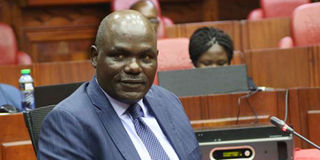Peaceful elections are a must to secure the country’s future

Independent Electoral and Boundaries Commission chairman Wafula Chebukati. PHOTO | NATION MEDIA GROUP
What you need to know:
- Mr Wafula Chebukati must start projecting power and independence by demonstrating to the public that he is a man who does not take orders from the players.
- Nairobi has lately been invaded by hordes of representatives of political risk advisory firms sent to understand the nuances of the current political environment.
- The consequence of having elections marred by violence will be dire for us because we are going into the poll at a time when the state of the economy is not good at all.
Will there be violence after the August 8 elections? Will interest rates hit the roof and how is the shilling likely to behave in the medium term?
These questions keep popping up in conversations in the diplomatic party circuit and whenever you talk to foreign investors with long term interests in Kenya.
Indeed, Nairobi has lately been invaded by hordes of representatives of political risk advisory firms sent to understand the nuances of the current political environment, the pre-election alliances that are emerging and how the coming elections are likely to affect the business environment in the medium term.
Instead of excitement, what you read in the air is anxiety. Today, academics who have studied Kenya for a long time wonder how – even after passage of the 2010 Constitution and the advent of devolved government - the conduct electoral politics still remains a very high stakes affair - a winner-take-it all game where insiders control power and wealth exclusively and where campaigns are conducted as if losing elections were a life and death affair.
What must we do to graduate from the ranks of failed states that invariably go through widespread violence at very electoral cycle - and whose economies plunge into recession in the year after every general election? I can’t claim to have the answers.
But I think that one thing that must happen now is a major change in the conduct of the affairs of the office for the chairman of the Independent Electoral and Boundaries Commission.
PUBLIC IMAGE
Mr Wafula Chebukati must start projecting power and independence, which he can do by assuming a larger-than-life profile and by demonstrating to the public that he is a man who does not take orders from the players.
We often forget that the eccentric personae and reputation for independent-mindedness, which Willy Mutunga enjoyed in the eyes of the public prior to the 2013 elections – was one of the key factors that played a major role in returning the country to normalcy after the poll.
Mr Chebukati must know that although public faith in him is an intangible factor, it is going to be a much bigger asset for him than the mere technical competence of staff working under him. He should not just sit there as some namby-pamby technocrat. Public image and support is what is going to deliver this thing.
We must prove to the world that we are capable of holding peaceful elections. Indeed, the consequence of having elections marred by violence will be dire for us because we are going into the poll at a time when the state of the economy is not good at all. Although the government and its cheerleaders within the World Bank and the IMF keep singing the monotonous chorus about how Kenya is well in advance of experiencing a six per cent growth, businesses in the real economy are feeling the heat from the effects of economic stagnation.
The banking sector - one of the economy’s mainstays - is grappling with a crippling slowdown in credit extension and a rising level of sector-wide non-performing loans.
DOWNWARD TREND
When you track the share prices of listed banks, that price to book ratios are on a downward trend. The Nairobi Securities Exchange has lost billions of shillings in market capitalisation. Indeed, within the capital markets, what you see is an unprecedented rise in profit warnings and retrenchment by corporates.
Even previous good performers such as big media houses are retrenching staff. The big supermarket stores – the Nakumatts and Tuskys of this world – that are usually a barometer on consumer spending - are also faltering.
Numbers from Kenya Power’s latest annual accounts show that electricity consumption by industrial consumers - manufacturers and small businesses - has stagnated. Oil prices have recently been on an upward trajectory, especially after Opec member states agreed to cut production.
Because of the drought we are experiencing, we expect high food imports, which will inevitably, exert immense pressure on the local currency.
Inflationary pressure is expected to increase in view of the act that we are shortly going to witness the most expensive election in the country’s history – in terms big spending by the political elite.
We expect presidential candidates, governors, and members of county assemblies to spend like never seen before, impacting on economic aggregates, with consequences for macro-economic conditions - and especially on the level of prices in the economy.
Let us all commit to peaceful elections in 2017.





